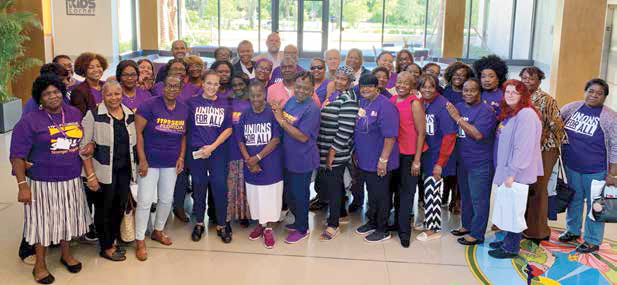Florida’s Silver Solutions Coalition Addresses the Challenges of Long Term Care
December 17, 2019
1199ers and partners are working for better health care for older Floridians.

On October 22 in Orlando, FL, more than 30 1199ers gathered with members and representatives of the American Association of Retired Persons (AARP) Florida, the Florida Health Care Association, and Leading Age Florida for a wide-ranging discussion of the challenges facing long term care in Florida, the growing complexities facing institutional caregivers, and ways to improve support for family caregivers.
The gathering of the Coalition for Silver Solutions provided an opportunity for advocates to help improve the efficiency of Florida’s long-term care system and increase funding for home and community-based care, assisted living facilities, and nursing home care. Coalition members work together on durable strategies for meeting the long-term challenges of quality health care for older Floridians.
And the needs are increasingly urgent. By 2030, more than one in four Floridians will be 65 or older and the state’s over-85 population is expected to triple in the next 30 years.
The interactive Summit, which was broadcast across several social media platforms, offered the public and coalition partners across the state the opportunity to hear directly from frontline professionals and policy experts.
Speakers included family caregivers, professional administrators, and state officials, including Mary Mayhew, Secretary of the Florida Agency for Health Care Administration, and Richard Prudom, Florida’s Secretary for the Department of Elder Affairs. In his remarks, Prudom emphasized a multi-pronged approach to care that includes treatment and prevention.
“The assumption that older people are a drain on resources is incorrect,” said Prudom. “Data suggests that how long we are sick adds more to costs than how old we are.”
Still, the needs of Florida’s older nursing home residents are becoming more complex. Annual statewide staff turnover rates at long term care facilities are surpassing 60 percent— driven in large part by stagnant wages and increasing workloads. Lagging Medicaid reimbursement rates are exacerbating a syndrome of existing problems.
“We must put our money where our mouth is and take care of our caregivers.”
–Sophia Colley, CNA at Titusville Rehabilitation and Nursing Center, Titusville
Sophia Colley, a CNA at Titusville Rehabilitation and Nursing Center in Titusville, joined Lakeside Nursing and Rehab administrator Connie Bend on the Nursing Home/Professional Caregiver Perspectives panel.
“A challenge I face every day is the number of residents I have to take care of,” said Colley. “Sometimes we don’t have enough staff to handle our workload and it affects our residents, who are like our family.”
Colley talked about sharing holidays with residents and even planning funerals in the absence of relatives.
“For what we do for our [residents], we deserve to get paid fairly,” said Colley. “Some of us can’t even afford health insurance. We must put our money where our mouth is and take care of our caregivers.”
Also on the day’s agenda were policy recommendations and a conversation about home and community- based care. Florida Region Political Director Roxey Nelson said the summit was important for the future of Florida’s health and the workforce responsible for it.
“This conversation about funding and providing quality care and backup for the workforce that provides care for us is really important,” said Nelson. “If people are not engaged in a conversation about this work and don’t have a say in it, we are not going to attr,act [future generations] to these professions.”
1199 Magazine | November - December 2019

